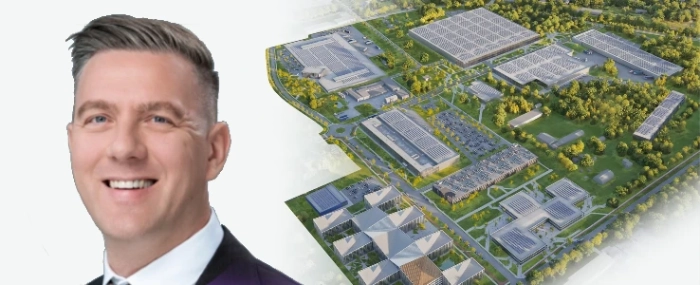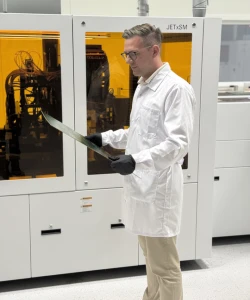
“We are not just building factories – it’s Europe’s strength for the future.”
TLT Manufacturing has been making headlines in recent months with its expansion strategy. In September, the Lithuanian electronics group inaugurated a EUR 320 million expansion in Vilnius, which included four new factories, highlighting its ambition to build a vertically integrated manufacturing park in Europe.

The group is making a major commitment to European production – building Europe’s first new PCB factory in 20 years, increasing investments in EMS, and outlining ambitions in the semiconductor space. Taken together, these initiatives reflect the group’s ambition to create a powerful European hub of electronics manufacturing, on par with Asia.
In an exclusive conversation with Evertiq, Vytautas Ilgūnas, Chief Commercial Officer of TLT PCB, explained the company’s long-term mission:
“We are not just building factories. We are building Europe’s future in technology, innovation and independence. Our mission is to protect and preserve Europe’s intellectual property, because it is the foundation of our innovation, our independence, and our future growth.”
The company’s approach is rooted in vertical integration. “We already have EMS, plastic molding, now PCB manufacturing, and in the coming years we will add a semiconductor chip factory, AI data centre and a power module assembly plant. This will be a hub where truly integrated manufacturing becomes reality,” Ilgūnas told Evertiq.
When asked why this ambitious step was taken now, he pointed back to the disruptions of 2020.
“It all began when COVID disrupted logistics from Asia, revealing how dependent we had become. Our group’s founder, Arvydas Paukštys, initially set out to build capacity for our own products, but the vision soon grew – today, we are expanding to serve customers across Europe. Once at full capacity, just in terms of PCB, we will produce 1,000 square meters of PCBs daily, making us one of the largest and most advanced PCB facilities in Europe.”
Besides technology, sustainability is at the core of the PCB facility. Automated processes, eco-friendly inkjet solder mask technology, and closed-chamber plating lines all contribute to higher precision and safer working conditions.
“Our manufacturing process is far more environmentally friendly than most PCB production methods in use today – we reuse 70% of our water and recover the majority of copper for reuse,” Ilgūnas explained. “Since 2018, our group has donated more than EUR 10 million to support people, change, and the future. This is how we combine business with responsibility.”
Europe’s reliance on PCB manufacturing in Asia has long been a growing problem. TLT PCB offers at least part of the solution.
“Ours is the first new PCB factory in Europe in two decades. We are already partnering with companies in defence, aerospace, and medical sectors — but safeguarding European intellectual property is critical for all electronics manufacturing. We can’t continue the old way of sharing everything with Asia,” he told Evertiq.
Rather than competing on cost, TLT PCB aims to deliver value in flexibility and quality.
“If we speak just about price, it’s not possible to compete with China. But we can compete with quality, speed, delivery time and development support. Fully automated processes allow us to be flexible and fast – no one else in Europe can offer the same scale,” Ilgūnas pointed out.
He also addressed challenges around raw materials and talent. “We are ready to work with European laminate and copper suppliers. Now our main partner is Ventec, but we keep close relations with others as well. On talent, our factory of 33,000 square meters will employ just 250 people thanks to automation. But we invest in people – we work with universities, send staff to other factories to learn, and almost 80% of our equipment is European-made, which ensures strong support from installation to serial production.”
Looking to the near future, the company is focused on building credibility through certification and quality assurance.
“Every product must pass strict quality checks. We have our own labs, test equipment and procedures. By the end of this year, we expect ISO 9001, followed by environmental and occupational standards, and next year we will target aerospace and defence certifications.” Ilgūnas explained.
As the interview ended, Ilgūnas reflected on the symbolic importance of building Europe’s first major new PCB facility in two decades.
“Ideas are the most valuable asset. By holding them in Europe, we ensure that our technologies, our knowledge and our progress remain in our own hands. This mission motivates us more than money or perks. We are carrying Europe’s flag forward – and we are happy to do it.”



